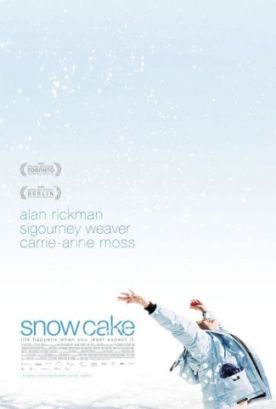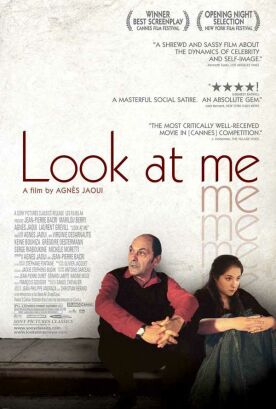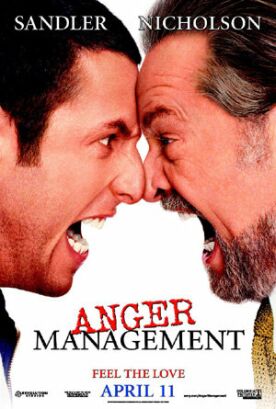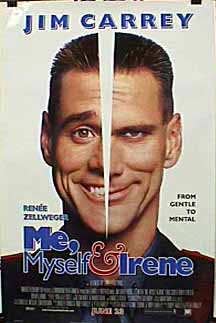Snow Cake
As a general rule, didacticism is never becoming in a movie, and this is even more true when the moral lessons being taught are as banal as they are in Snow Cake, directed by Marc Evans, a veteran Welsh director in his first film to be released in America. The film began with a screenplay by Angela Pell, who has an autistic son and so decided to write a script that would teach us about autism — and about how autism teaches us about life. Unfortunately, these life lessons tend to boil down to the following: live for today and be tolerant of others’ foibles. You may find it astonishing, as I do, that anything beginning from such unpromising materials generates any emotional heat at all. That Snow Cake does, a bit, is owing to the camera of Mr Evans and his director of photography, Steve Cosens, in cooperation with the wintry landscapes of Ontario, and two fine actors — Alan Rickman and Sigourney Weaver.
Mr Rickman plays Alex Hughes, an Englishman with a secret sorrow — which we learn about gradually over the course of the film — who is driving across Canada to Winnipeg to meet someone of significance in his past. We know this because he is turning over a photograph in his fingers as his plane lands from Britain. Along the way, he picks up a talkative young hitch-hiker called Vivienne (Emily Hampshire). Shortly afterwards, their car is slammed into by an eighteen-wheeler, and Vivienne is killed. Unharmed himself but badly shaken by the accident, Alex feels impelled to visit Vivienne’s mother, Linda (Miss Weaver), in Wawa, on the shores of Lake Superior, to express his regret, even though he wasn’t at fault.
On arriving at her house, however, he is shocked to find Linda completely unemotional about her loss. Soon he realizes that she is autistic and more or less incapable, not only of grief but of anything involved with what she disdainfully calls “social” — that is, normal human contact. This also means, of course, that she can take no part in the arrangements for Vivienne’s funeral, so, since there is no one else to do it, Alex agrees to stay on for a few days to take charge. This means having to put up with Linda’s many bizarre habits — like eating snow or attempting to feed her dog an unpeeled banana — and her obsessive neatness.
You’ll see where this is going, I think. Alex learns about life, and about living in the present moment, from the autistic lady — who is of course unable to do anything else. Coincidentally, he also gets back in touch with his stopped-up emotional life through a sexual liaison with Maggie (Carrie-Anne Moss), the obliging lady next door — who, so Linda tells him, is a prostitute. Maggie is a life-lesson too far, I’m afraid. Though not a prostitute, she is improbably beautiful and improbably ready to take charge of Alex’s emotional needs. “I really like you,” she says to him over the shrimp cocktail, shortly after he arrives at her house for dinner. “And I hate having sex on a full stomach, so can we just skip the main course and move next door?”
No wonder he takes Linda at her word and offers to pay afterwards! Not only is Maggie too easy, so is the lesson that she has to teach about emotional availability. Too easy and way too movie-conventional. The rapidity with which she coaxes Alex out of his supposedly hardened shell of grief and guilt into an emotional resurrection strikes a false note in itself and accentuates the film’s preachiness. It also undercuts the good work being done elsewhere with the help of its bleak and painterly views of Lake Superior and its quirky but sometimes effective vision of what it means for life to go on.
And the glibness returns at the end, as Snow Cake tries to make Linda into a kind of idiot-savant, just as Maggie is a therapeutic prodigy. Alex departs with this encomium to the former. “You have been very annoying. You’ve also been a friend. I’m going to miss you. . . You are the only person I have ever met whom I didn’t have to explain or even justify myself to.” Well, except for Maggie I guess. That Alex has to learn to forgive, both himself and others, is fair enough, but it doesn’t require this awkward and unconvincing erection of non-judgmentalism into a principle — as if it were all so much easier for us, now that Alex has formulated the lesson for us, than we know it has been for him.
Part of the problem is that we have to accept and be non-judgmental towards the autistic because they are disabled. They can’t help being anti-social. But for the same reason, they can’t be a lesson to the rest of us — as, when it over-reaches like this, the film wants to make us believe they are or ought to be. Reveling in our own compassion and understanding, we are liable to find big moral and spiritual truths where there are, in truth, only much more humble forms of solace to be had. Snow Cake should have stuck to these.
Discover more from James Bowman
Subscribe to get the latest posts to your email.







